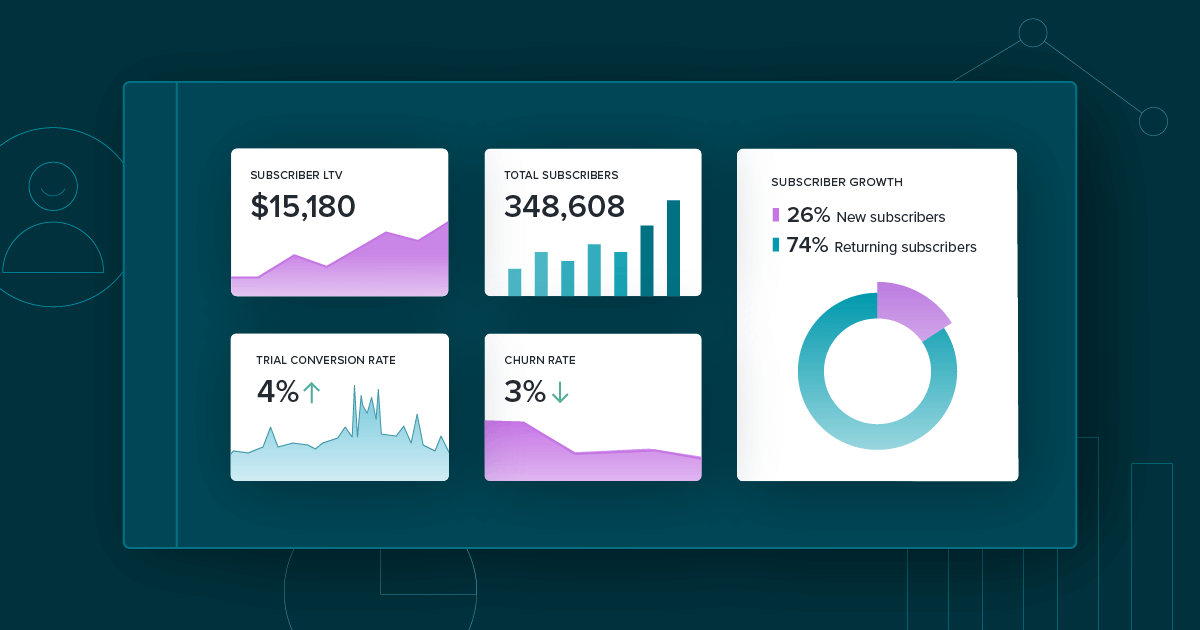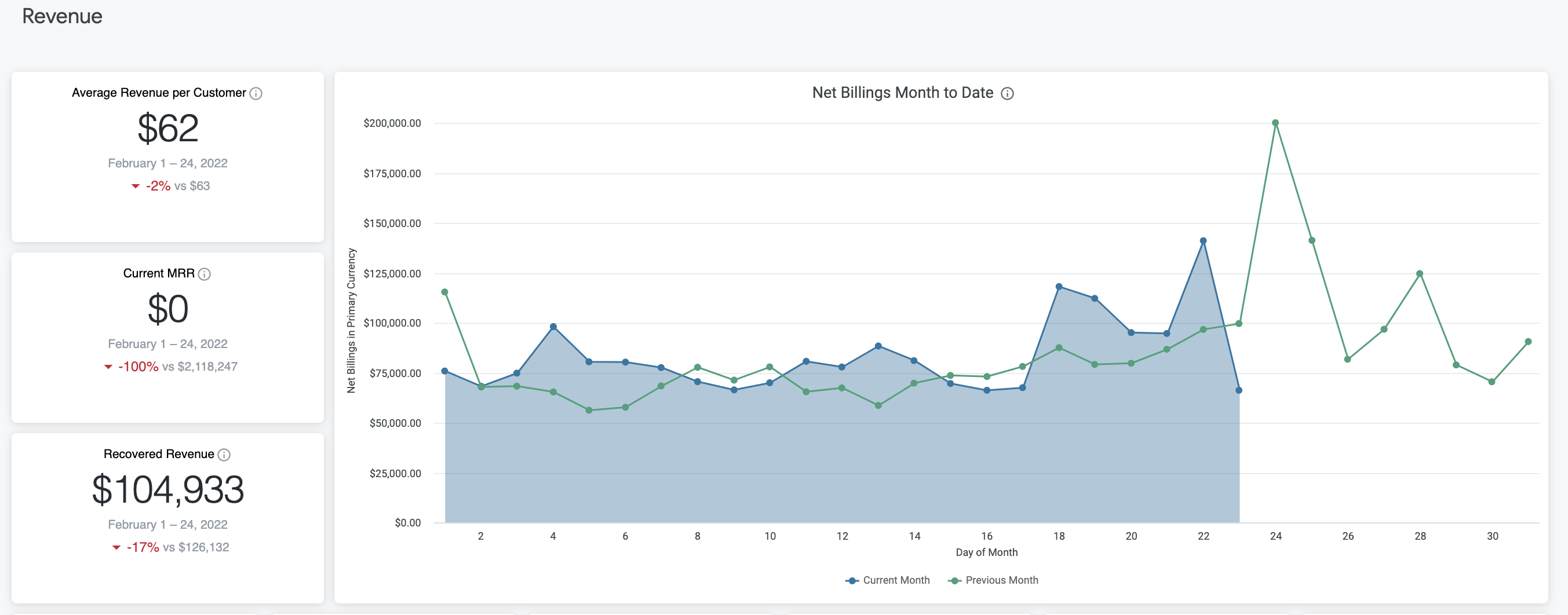Consumer insights: A guide for subscription businesses

Anticipating consumers’ needs has become the main goal for most subscription businesses, especially in challenging economic times. Quality, actionable subscriber insights are the most effective way to achieve it.
The importance of subscriber insights analysis
Consumer insights give you a deeper understanding of how your audience behaves and why–helping you improve your product offerings, design new marketing strategies, and increase sales. According to Microsoft, companies that leverage their customer behavior data to generate insights outperform competitors by 85%.
Think of your buyer’s journey, analyze its touchpoints, and the data you’re getting from each. How are these insights related? What do they tell you? How can you turn this data into actionable items?
Perhaps you see a sign-up trend in August and September, but that’s because you’re an on-demand online learning platform, and students are getting ready for university. Or maybe you see rapid growth in specific markets, but that’s because you’re offering more local payments.
Learn how to improve customer experience with subscriber insights.
5 consumer insight metrics you should track
Even though every business is different, there are subscription insights metrics you should measure regardless of your industry.
Customer acquisition cost (CAC)

Use this metric to calculate all your costs associated with acquiring a new subscriber: marketing, sales, and related headcounts. Your CAC will tell you the effectiveness of channels and promotions and how long before you can expect to start profiting from your subscribers.
Lifetime value (LTV) and LTV: CAC ratio

Use this metric to forecast the total revenue you can expect from a subscriber over time. It helps you identify the most and least profitable consumers and how much money you must spend on acquisition to stay profitable.
Combined with CAC, LTV will determine if you’re spending too much to acquire consumers.

LTV that exceeds CAC means your acquisition campaigns are profitable. Aim for a 3:1 ratio as your standard. A 5:1 ratio means you could be growing faster and should invest more in your marketing efforts.
Trial conversion rate

Use this metric to measure the rate at which users who signed up for a free trial became paying subscribers. It helps you determine the effectiveness of your trials and how successful it is to produce valuable subscribers.
Subscriber churn rate

Use this metric to determine how many subscribers are leaving your company. The most basic churn rate calculation is dividing your churned subscribers by the total number of subscribers.
Retention rate

Use this metric to find the percentage of subscribers you retain through a specific period, excluding new subscribers. A simpler math to determine retention rate is: If your churn rate is 3%, then you keep 97% of your consumers.
3 easy-to-use consumer insights tools
With all the data you can get from subscribers, it may feel overwhelming to get started. Here are three convenient tools to help ease the process of data capturing.
ChartMogul
This analytics platform easily calculates your LTV, churn, MRR, and more important metrics–allowing you to analyze data by plan, date range, geography, and subscriber cohorts for a 360 view of your business.
ProsperStack
This platform automates and enhances subscriber acquisition and retention experiences so you can keep the customers you’ve already earned with targeted offers like coupons, trial extensions, subscription pauses, and plan changes.
Snowflake
This cloud data platform offers data warehousing, data lakes, data engineering, data science, data application development, and data sharing solutions. Get the insights you need to give subscribers better reasons to stay.
Finding actionable insights in Recurly Analytics
Collecting subscriber insights can be challenging, but it shouldn’t be. Our customers have found a single source of truth in the Recurly Analytics hub, which can easily sync with your existing ERP and CRM.
Recurly supplies you with robust subscription business analytics, intelligent insights, and informative dashboards for strategic desicion-making. Our easy-to-use dashboards tell you everything you need to know about:
Customer behavior. Evaluate subscription behavior over time with net subscriber change data, churn rate, and LTV.

Subscription preferences. Identify your most popular plans based on total subscriptions insights and inspect business growth trends over time.

Revenue overview. Report on key revenue metrics like net billings, average revenue per customer, and monthly recovered revenue.

Change generic reports for personalized dashboards, KPIs, and graphs that help you optimize your plans, subscribers, and revenue streams for faster growth.
Tell us more about your goals and we’ll provide you with the analytics tools you need.
Turning consumer insights into subscription success
It’s no surprise that companies are now turning to personalized experiences for subscriber growth and retention. Delivering exceptional customer experience is now a necessity–and it all starts with compelling subscriber data.
TeacherVision, for example, uses insights to take effective steps to reduce churn, Digital Reach uses data to find the most successful plans, and Returnloads.net to better understand its business seasonality.
Learn how Recurly customers are driving subscription growth using consumer insights.
Answering your consumer insights FAQs
What's the difference between market research and consumer insights?
Both terms aim to understand subscriber behavior; however, market research gathers data from an entire market, while consumer insights are specific to your business.
How can you get started using customer insights?
Start with setting a goal: reduce churn, improve customer experience, or test different trial lengths. Then determine where subscriber data comes from and how it is collected, managed, and measured.
How can you gain a competitive advantage in customer insights?
Consumer insights build competitive advantage when the learnings from today’s subscribers translate into product improvements quickly and more accurately.


